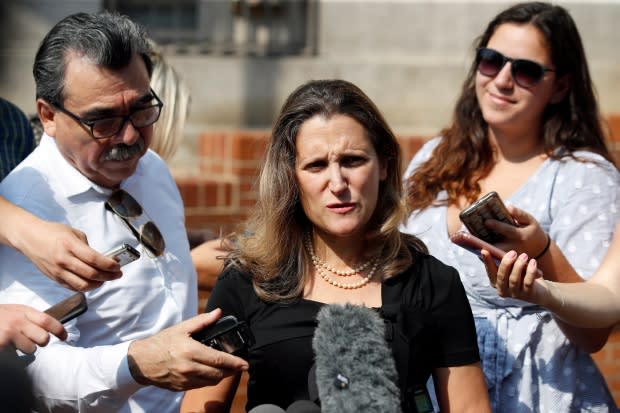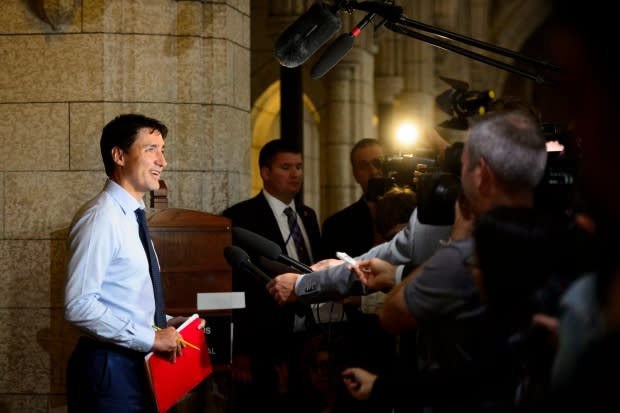With Congressional deadline looming, Freeland pushes back against calls for swift NAFTA deal
With a U.S. Congressional deadline looming, Foreign Affairs Minister Chrystia Freeland told reporters in Washington today that the only NAFTA timeline she's working to is the one that will end up delivering the deal Canada wants.
"The only target we are aiming for is getting a good deal for Canada," she said after meeting with her counterpart, United States Trade Representative Robert Lighthizer.
"Our officials now have some more work to do, and will continue working this evening, and then Ambassador Lighthizer and I agreed to meet again tomorrow."
Asked why the negotiations on a revamped NAFTA were taking so long, Freeland insisted that negotiators were taking the time they need to hammer out a fair deal.
"For an agreement of this scale, 13 months for a very deep modernization of the kind we're working on is absolutely normal," she said. "Trade agreements do take some time both to negotiate and to update because the economy is complicated and trade agreements are complicated."
Earlier in the day, Freeland thanked Canadians for their support after her team of negotiators worked through the night in Washington D.C. leading up to the resumption of high-level trade negotiations with the Trump administration today.
She was asked by journalists before her meetings about remarks by U.S. House Ways and Means committee chairman Kevin Brady, who said in a CNBC interview Wednesday morning that Canada should "step it up" to meet this week's deadline for a new agreement.
"I am paid in Canadian dollars. U.S. legislators are paid in U.S. dollars," she said. "It is my job to stand up for the national interest."
'Digging in'
Freeland said that Canadians have been sending flowers, chocolates and notes to her office to let her team to know they strongly support Canada in this negotiation.
In Ottawa, Prime Minister Justin Trudeau told reporters on his way into the weekly Liberal caucus meeting that his team is "digging in" in Washington.
"We've been very clear that we're interested in what could be a good deal for Canada, but we're going to need to see a certain amount of movement in order to get there, and that's certainly what we're hoping to see," he said.

Trudeau and U.S. President Donald Trump spoke by phone Tuesday evening. According to Trudeau's office, the prime minister "reaffirmed his commitment to a deal that works for both countries."
The call between the two leaders followed a day of rising tension on both sides, with Freeland insisting that Canada's refusal to sign a bad deal wasn't simply rhetoric. Meanwhile, one of Trump's loyalists in Congress, House majority whip Steve Scalise, issued a statement expressing frustration over how long Canada is taking to join the preliminary deal the U.S. worked out with Mexico last month — and warning of Congressional action if it fails to do so.
Meanwhile, Ontario Premier Doug Ford travelled to Washington for a day of meetings Wednesday at the Canadian embassy. Freeland told reporters that she was on her way to meet with the premier after her first session with Lighthizer. It will be the third time she and Ford have discussed the progress of the NAFTA talks, she said.
Ford told reporters Ontario is standing "shoulder to shoulder" with the federal government and thanked negotiators for their hard work.
"We're gonna get this deal done, hopefully sooner than later," he said.
Since taking office, Ford has expressed his support for Canada's supply-managed farm sector, joining Quebec's premier in backing the dairy industry amid renewed American pressure to offer additional access to Canada's protected market.
"Farm jobs are not a bargaining chip," he told reporters before leaving for Washington.
'Enough is enough'
In Ottawa, the Dairy Farmers of Canada held a press conference Wednesday morning to say that "enough is enough" — that Canada already has given up slices of its market in past trade deals and the industry cannot afford to be undermined by the government's decisions again.
"For American farmers, the Canadian market is a drop in the bucket. For us, it is our livelihood," said the dairy farmers' Manitoba chair, David Wiens.
Trump has indicated that dairy concessions will be required of Canada in order to reach a deal. Negotiators met overnight, trying to bridge the gap between the American and Canadian positions.
Farmers insist that their industry is not blocking an agreement. Canada's market is not the solution to the United States' chronic overproduction in its dairy sector, they said.
The CBC's Julie Van Dusen asked the assembled dairy farmers from across Canada to raise their hands if they believed Canada's government would defend their industry in the NAFTA talks. They all put their hands up.
The Dairy Farmers of Canada press conference was called "not to question or to belittle the government," Ralph Dietrich from the Dairy Farmers of Ontario said. "It's the exact opposite. It's to show our appreciation for what they're doing."
Canada's is the "only proven system of producing milk in the world that works."

"We will continue to defend supply management. This is a system that works for Canadians," Trudeau told reporters on Parliament Hill.
Reporters asked if a compensation plan is being prepared, in light of not only expected NAFTA concessions but also Canada's progress toward implementing the Comprehensive and Progressive Trans-Pacific Partnership agreement, which opens up 20 supply-managed agricultural products to new foreign competition from Asia.
"There are always certain areas and industries that are more exposed, so we're going to make sure that we're working with them to make sure that the benefits of trade are felt broadly for everyone," Trudeau said.
Deadline 'not ours'
Negotiators in Washington are working toward a deadline indicated by Freeland's Mexican counterpart last week: in order to have text of a potential agreement ready by the end of the month, all three countries need to agree on a broad outline for a trilateral agreement by Thursday, to give legal teams about 10 days to work out final details.
Unifor president Jerry Dias was also in Washington for briefings Wednesday. The labour leader accused conservative politicians like federal Conservative Leader Andrew Scheer and Ontario's Economic Development Minister Jim Wilson of engaging in "petty politics" by suggesting it's time for Canada to settle.
"Getting a deal is easy. I negotiate for a living. Anybody can carve a bad deal," he said. "Exactly what do they want Canada to surrender on in order to close the deal?
"The Americans are going to have to start to signal that they want a deal in a serious manner. I think that Canadians are expecting the Canadian team to hang firm."
This week's deadline is "not ours," Dias said.
The end-of-September deadline was set in the hopes of hitting the Congressional timeline required for a renegotiated North American Free Trade Agreement to be signed before Mexico's presidency changes hands on Dec.1.
Freeland is expected to be in New York next week for the United Nations General Assembly.
With files from Peter Zimonjic

